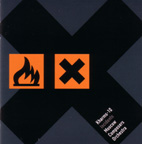MOSCOW COMPOSERS ORCHESTRA Moscow Composers Orchestra was formed nearly ten years ago by the trumpet player Andrew Solovyov, and during the initial stages of its formation the orchestra met infrequently and perfomances were rare. But during this early period MCO devised a concept which had similarities as a definitive with O'Henry's novel 'Kings and Cabbages' (the title of the first CD release on Leo Records in 1993). Where the novel includes everything apart from kings and cabbages, so the orchestra is made up of musicians other than muscovite composers and performers, although over the years, it has to said, indigenous musicians have been included. There have always been reasons and excuses for the orchestra to get together: to kick off a jazz festival, to celebrate the sighting of Hallee's Comet or quite simply for musicians to have the opportunity to play in an alternative setting. This time the orchestra meets and once again is living up to its reputation as an orchestra with a diversity of musicians arriving from many different destination points. They include musicians from Moscow, Arkhangelsk, St.Petersburg, Kyzyl, Vilnius, Berlin and London. Perhaps the orchestra should be known as the Russian or European Composers Orchestra, but one would not like to break with tradition. Today's 12-piece orchestra is being led by a British composer and pianist Vladimir Miller. He is performing with his friends - musicians from Russia and beyond, and plays with them his orchestral works. Nick Dmitriev, 2003 In memory of Nick Dmitriev, Friend, collaborator, and manager of Moscow Composers' Orchestra Music with spoken text will always be an ambitious creative activity to take to the stage. There are two important considerations. The first and most important is why do it at all? The second is achieving a successful balance between text and music. To think of Daniil Kharms and his collection of prose, stories and 'incidents' as anything other than rooted in the time it was written is hard to comprehend. He comments on the whole against a Leningrad backdrop, observing the despairing fashion in which people lived. Yet there is an omnipotent free spirit lingering and a primeveal rootlessness. His characterizations and situations could easily be placed in today's world of absurd reality and behavioral extremes. These can be seen in the bars and cafes in Moscow and St.Petersburg or indeed any city. This transcendental notion places Kharms in a very flexible position particularly apparent in his 'incidents', which suggests a multitude of genre disciplines, especially the non-literary: the comic monologue, carnival, pantomime, and the silent movie. Why not on stage with a jazz improvising orchestra. And so when considering what position in order of importance Daniil Kharms should take with us on stage, a simple decision was reached. Rather than a substantial collaborative partner or a honorary spectator, he would be part of the orchestra, alongside the saxes, the bassoonist, the brass and rhythm section. In this sense it seemed important in the act of structuring the music that distinctive references be made to the fragmental and miniatural style inherent in the prose, and that balance be accorded between the absurdist interaction of his characters and the impulsive actions of the orchestral soloists. There are as such, no formulaic definitions of jazz, only melodic and rhythmical symbolic connections. As an experimentalist Kharms would relish the idea of being part of an expressive free blowing improvisation section. He himself stated, 'Real art stands side by side with the first reality. It creates the world and is its first reflection'. Afteral he operates using an unconventional language, his sentiments propelled by simple insights into the ordinary, macabre, and unimaginable. Yet not all the pieces on the recording are conclusively about striking a balance. For instance, during the unpleasant rivalry between Mashkin and Koshkin in 'Mashkin killed Koshkin', the musicians, gradually as the plot unravels, symbolize the actions of Mashkin, and Kharms that of Koshkin. The performance of the piece does not conclude one way or another because the dictates of instantaneous performance possess their own powers of conclusion. in 'Vladimir and the Hunter' there is an undercurrent of sympathy and congeniality with the musicians taking on the theme of being hunted, rather than Kharm's comical stance on the act of hunting. similarly in the abstract 'Incident', 'The Artist and the Clock' has a compromising energy, as if the improvisation were built around a preconceived idea rather than the meeting of two opposites. The presence of Kharms is exceptionally felt in 'A Man Left His House' and The Happy Old Man'. With the ridded tempo bouncing along merrily in the latter, there is a feeling in 'A Man Left His House', that it is Kharms himself that has left the house. Effectively he takes the improvising lead role and takes the orchestra with him into the darkness of impulsive interaction and anarchic sonority. And as Kharms leaves the stage 'he walked ever onward, he walked ever straight, he never slept, never drank, never drank slept or ate', so we applaud his contribution and adoption to his new surrounding reality and never ending quest for creative exploration. Vladimir Miller
Shipping method
After the confirmation of the order we send the disks by Russian Post with tracking option.
Shipping time
The standard shipping by air from Russia to any country usually takes not more than 3 weeks (15 business days).
Shipping costs
1-10 disks - $20
11-15 disks - $25
16-20 disks - $30
more than 20 - double quantity USD
Payment
The preferred payment type is PayPal.
We prefer to send the disks after the payment.
In some cases it is possible that we send the disks before the payment.
Refund
Issuing refunds is possible if there are some problems.


